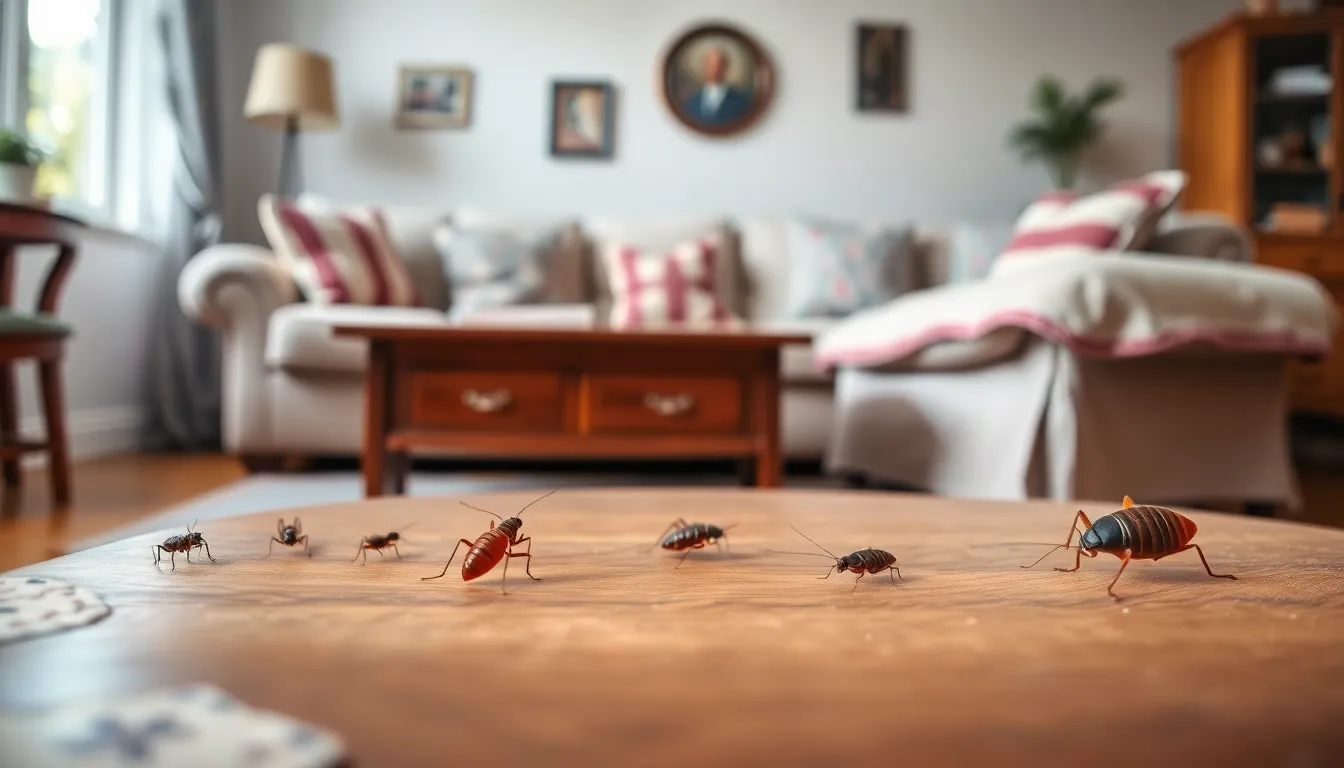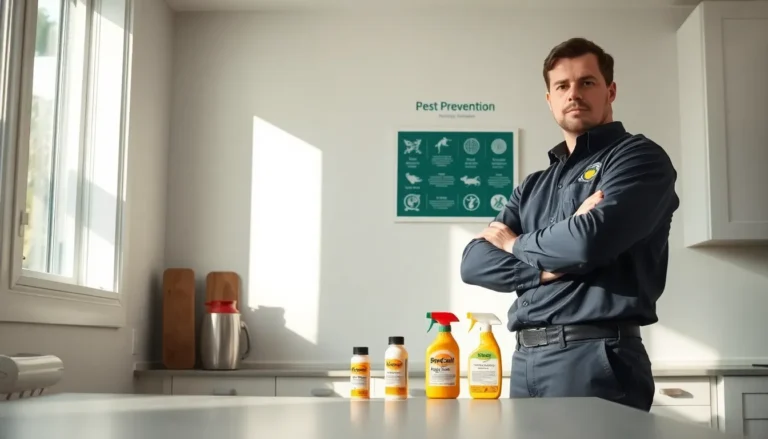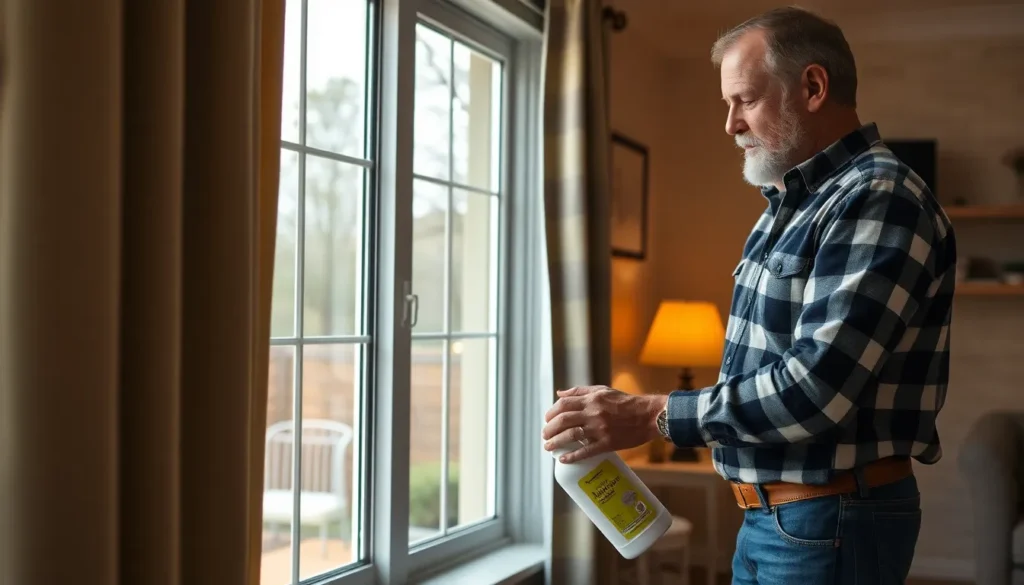Table of Contents
ToggleEvery homeowner knows that the only thing worse than a surprise guest is a surprise pest. Whether it’s ants marching through the kitchen or cockroaches throwing a party in the pantry, uninvited critters can turn a cozy home into a chaotic battleground. But fear not! Home pest control doesn’t have to be a daunting task. With the right strategies, you can reclaim your space and send those little intruders packing.
Imagine a home where you can relax without the fear of tiny feet scurrying across the floor. It’s not just a dream; it’s entirely possible! From simple DIY tricks to effective professional treatments, pest control can be both fun and effective. So, buckle up as we dive into the world of home pest control and discover how to keep your sanctuary pest-free while keeping your sanity intact.
Overview of Home Pest Control
Home pest control focuses on managing and eliminating unwanted pests that invade living spaces. Effective strategies include both preventive measures and active treatments. Homeowners can implement preventive approaches like sealing entry points and maintaining cleanliness to deter pests. Regular inspections help identify potential infestations early, minimizing damage and disruption.
DIY pest control techniques offer immediate solutions for minor infestations. Homeowners often utilize traps, baits, and natural repellents to address specific pest issues. For example, vinegar effectively repels ants, while essential oils can deter spiders and other insects. However, the effectiveness of these methods varies based on pest type and severity of the infestation.
Professional pest control services provide more comprehensive solutions for larger infestations. Trained technicians assess the situation and apply targeted treatments that are often more effective than DIY methods. Many pest control companies offer eco-friendly options, catering to environmentally conscious homeowners. These treatments commonly include integrated pest management, which combines various techniques for long-term control.
Understanding the lifecycle and habits of common pests aids in developing an effective control plan. Pests like rodents and insects reproduce quickly, making proactive management crucial. Homeowners often benefit from regular pest control check-ups, ensuring persistent issues are managed before they escalate.
Educating oneself about local pest trends enhances prevention efforts. For instance, seasonal changes impact pest activity, with some pests more likely to invade homes during specific times of the year. Staying informed allows homeowners to take timely action against potential infestations.
Overall, home pest control combines various methods and knowledge about pests to create a peaceful living environment. Through education, vigilance, and professional assistance, homeowners can effectively manage pest threats.
Common Household Pests

Homeowners often encounter a variety of pests in their residences. Understanding these common pests helps in identifying and addressing infestations effectively.
Identification of Common Pests
Identifying common pests involves observing specific traits. Ants typically form trails and invade food sources. Cockroaches are known for their dark color and quick movements. Bed bugs appear as small reddish-brown insects that hide in mattresses. Termites cause significant damage by consuming wood, leaving behind hollowed structures. Spiders vary in type but often build webs in corners. Recognizing these indicators aids in prompt action.
Impact of Pests on Homes
Pests can significantly disrupt daily life in homes. Rodents and insects can contaminate food and surfaces, posing health risks. Termites alone cause billions in structural damage annually in the U.S. Additionally, persistent infestations lead to increased stress for homeowners. Pests often trigger allergies and respiratory issues, affecting family well-being. Addressing infestations promptly protects property and promotes a healthier living environment.
Home Pest Control Methods
Homeowners utilize various methods to manage and eliminate pests effectively. Techniques range from chemical solutions to DIY strategies, each offering unique benefits.
Chemical vs. Organic Solutions
Chemical solutions often deliver rapid results against stubborn pests. They contain potent ingredients that target insects effectively, making them suitable for severe infestations. Organic solutions consist of natural ingredients and create a safer environment, especially for families and pets. While chemical options may pose risks, organic methods minimize health hazards, appealing to environmentally conscious homeowners. It’s essential to assess the severity of the infestation when choosing between solutions. Effective pest management often requires a combination of both approaches for optimal results.
DIY Pest Control Tips
Simple DIY pest control tips provide immediate assistance for minor infestations. Sealing entry points, such as cracks and gaps, limits pest access. Cleaning food debris and maintaining a clutter-free home deter pests from taking residence. Traps and baits strategically placed in hotspots catch unwanted insects. Additionally, natural repellents like vinegar or essential oils offer safe alternatives for repelling pests. Regular inspections help identify problems early to prevent escalation, ensuring a healthier living environment.
Professional Pest Control Services
Professional pest control services offer effective and lasting solutions for serious infestations. Homeowners often benefit from the expertise and resources these services provide.
When to Hire Professionals
Homeowners may need to hire professionals when facing significant infestations or ongoing pest issues that DIY methods cannot resolve. Identifying signs of pest damage, such as droppings, nests, or visible insects, often necessitates professional intervention. A persistent problem involving multiple pest types indicates a larger issue that requires specialized knowledge and tools. Additionally, allergies or health risks present from pests like rodents or cockroaches call for immediate action from professionals. Addressing these concerns promptly can prevent more extensive damage and health risks.
Cost Considerations
Understanding the cost of professional pest control helps homeowners make informed decisions. Factors influencing the cost include the type of pest, the size of the infestation, and the area of the home affected. Initial consultations typically range from $50 to $200, while treatment services may cost anywhere from $100 to $500, depending on the required methods. Many companies offer service plans that can reduce expenses over time, with annual plans averaging between $300 and $600. Weighing the potential health risks from pests against treatment costs often emphasizes the value of investing in professional pest control services.
Preventative Measures for Pest Control
Preventing pest infestations requires ongoing attention. Homeowners can significantly reduce risks by implementing effective strategies.
Regular Maintenance Tips
Regular home maintenance plays a vital role in pest prevention. Check for cracks and gaps in walls, windows, and doors, sealing these potential entry points. Maintain clean surroundings by promptly disposing of food waste and keeping counters free of crumbs. Inspect plumbing for leaks, as moisture attracts pests like cockroaches and ants. Routine yard maintenance should include trimming bushes and trees that can provide pathways for pests. Conduct periodic inspections to identify any signs of infestation early.
Creating a Pest-Resistant Home
Creating a pest-resistant home involves several strategic steps. Start by removing clutter, as it provides ideal hiding spots for pests. Store food in airtight containers to deny access to insects and rodents. Use screens on windows and doors to keep pests outside while allowing fresh air in. Choose landscaping plants that naturally deter pests, such as marigolds and lavender. Additionally, consider installing door sweeps and weather stripping to eliminate gaps that allow pests to enter. Each change strengthens barriers against unwanted invaders.
Managing pests at home is essential for maintaining a healthy and comfortable living space. By combining proactive measures with effective treatment options homeowners can significantly reduce the risks associated with pest infestations. Whether opting for DIY solutions or seeking professional help it’s important to stay informed and vigilant.
Regular inspections and preventive practices can go a long way in deterring unwanted guests. Ultimately investing time and resources into pest control not only protects the home but also enhances peace of mind for everyone living there. A pest-free environment is achievable with the right approach and commitment.







